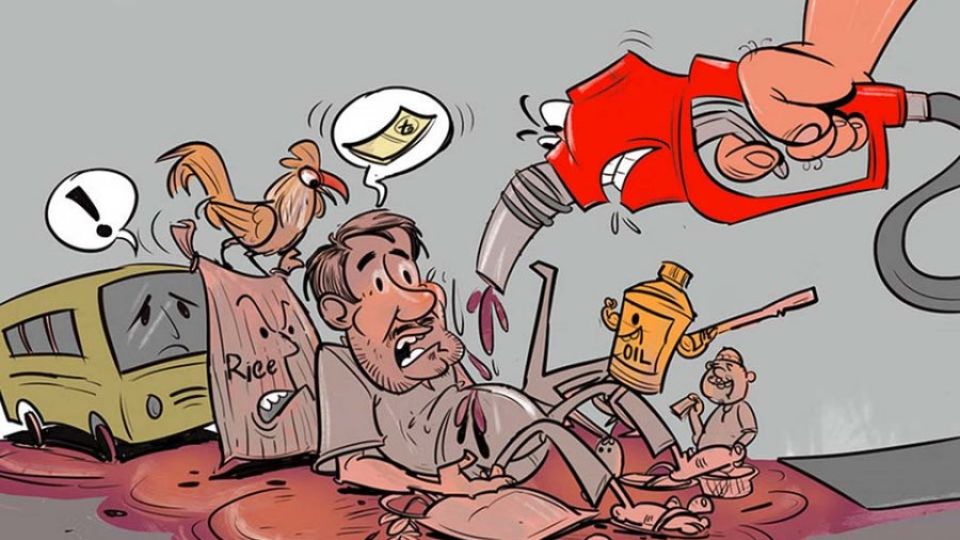February 10, 2025
DHAKA – Dhaka, my beloved city, where even the air charges rent. If breathing deeply doesn’t suffocate you, the price of living surely will. Bangladesh’s cost of living has soared so high that even Elon Musk might pause before buying groceries here. Meanwhile, our standard of living? Let’s just say it’s like serving instant noodles on a platinum plate.
Picture this: you’re at the local bazaar, trying to buy onions. That quintessential Bangladeshi rite of passage where your bargaining skills are tested alongside your cardiovascular health. You approach the onion vendor, fully prepared for a duel of wit. The vendor quotes a price that could fund a one-way trip to Bangkok. You laugh nervously, hoping it’s a joke. It’s not. You hand over half of your monthly salary for a kilo, knowing that the next stop is the kidney exchange booth, where desperate buyers and sellers of human organs congregate to fund their grocery bills. And there you are, trading half your paycheck for a vegetable that’s as essential as oxygen but priced like a Chanel handbag. By the time you’re done collecting your overpriced onions, tomatoes, and eggs, you’ve calculated that dinner tonight will cost more than your last vacation.
The tomatoes are staring at you like forbidden fruit, each one priced as if it were signed by Cristiano Ronaldo. Eggs? Oh, darling, eggs are a status symbol now. If you serve a fried egg at brunch, expect your neighbours to whisper about your suspiciously lavish lifestyle.
But what are you returning home to? A Dhaka apartment—a marvel of minimalist living where you pay for the square footage of your dreams but inhabit the reality of a sardine can. Your walls are so thin you can hear your neighbour’s life story, unprompted, every night. The bathroom? A multi-purpose space where you can shower, brush your teeth, and scream into the void—all within arm’s reach. And yet, the rent is astronomical, as if the cockroaches come with gold-plated shells and the leaky ceiling is some avant-garde water feature.
Transportation is another gem in the crown of our high-cost, low-standard economy. You can pay a hefty toll to cross the Padma Bridge in your beat-up car that will break down halfway, forcing you to walk the rest of the way like a medieval pilgrim. Meanwhile, public transport is a lottery system where you either make it to your destination or meet your maker, whichever comes first.
Then there’s the dining-out experience. A dinner date in Dhaka will cost you a fortune for mediocre food served in dim lighting (because who needs electricity when candlelight is “romantic”?). Your significant other might gasp at the price, but don’t mistake it for love—they’ve just realised they won’t eat for the rest of the month.
And what of education, the beacon of hope for the next generation? Schools charge fees that could fund a small country, only to teach children how to spell “orange” as “ornge.” Tuition costs rise faster than Dhaka’s air pollution levels, but the only thing your child learns with absolute certainty is how to pronounce “homework” as “homwark.” University fees? Let’s not even go there.
But wait—there’s hope! Our government’s strategic response to inflation is ingenious: import luxury cars for ministers. Because nothing screams “fiscal responsibility” like a line of black SUVs zipping through waterlogged streets while regular citizens are waist-deep in sludge, wondering how to afford next month’s rice.
And while we’re speaking of potholes, they’re the unofficial mascot of Dhaka. No matter how much you pay in taxes, these craters remain untouched, like ancient relics. Tourists might mistake them for archaeological sites, while we locals treat them as impromptu swimming pools during floods.
And yet, we carry on. We joke about smuggling onions, make memes about egg inflation, and laugh so hard at our own misery that we forget we’re crying. Dhaka has taught us resilience, and not the glossy, Instagrammable kind. No, this is the gritty, street-smart resilience that makes us experts in survival and sarcasm.
So, here’s to us—living champagne-priced lentil lives, dodging manholes, and making humour our unofficial currency. Because if there’s one thing Bangladeshis excel at, it’s laughing in the face of absurdity. And honestly, with the price of onions, laughter is the only thing left that’s still free.


